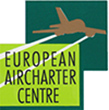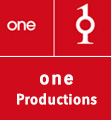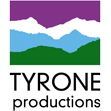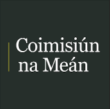English-language, economical, efficient, are just some of the marketing buzz words associated with ‘what distributors want’. Universal, UK-influenced, US-based are words often used to describe Irish productions. These attributes married together are theoretically the ideal recipe for a successful international television format.
So why is it that when Britain is leading the way in selling these global phenomena to international distributors, Scandinavia is a nearby second, and the US is trailing behind in third place, Ireland doesn’t even feature on the international distribution map?
Granted, Ireland is a considerably smaller market, with extraordinarily lower budgets, and significantly fewer production companies. Britain has been the world’s number one format creator since 2009, and although its 41 per cent share of the market has dropped considerably since then, it still managed to rake in €378m (£305m) from formats in 2011, compared to France and Germany’s €304m.
This year, the TV Formats in Europe report announced Granada Television’s (ITV Studios) ‘Come Dine With Me’ was the most screened TV format in Europe last year. It surpassed Endemol’s ‘Big Brother’ and Sony’s ‘Who Wants To Be A Millionaire’, which until now, was the most successful TV format in history.
It brought in more than €172m (£139m) for ITV Studios in 2011, almost double the revenue from 2009. It aired 4,126 hours in 2011. Philip Morrow, founder of Northern Ireland’s Wild Rover Productions, says the cookery-based format’s success is more likely down to the number of hours it has been shown, rather than the money it brings in. “Shows like 'The Voice' and 'X Factor' cost a lot more money, purely to make [than ‘CDWM’], so success can be measured in a number of different ways.
”In terms of easiness to sell, it helps if you have some universal themes within what you do, for example, if you take ‘CDWM’, at the end of the day, all across the world, people like to have meals with each other. So you have a starting point that is very universal there. Then you can obviously easily translate it culturally to the types of food and the types of homes and the types of people that exist in an area the show is being filmed.”
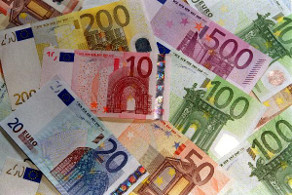 TV formats are big money makers
TV formats are big money makers |
Wild Rover, with Morrow at the helm, is responsible for bringing hidden camera comedy show ‘Just for Laughs’ to the BBC, as well as ‘Secret Fortune’, the money-based gameshow which is currently in its third series, also on BBC. The Belfast-based production company is considered one of the most successful regional-based production companies, however, while ‘Secret Fortune’ has been optioned in an additional 16 territories, Morrow admits there a few opportunities in Northern Ireland and the UK for a format to take off globally.
A gameshow which he originally pitched to the BBC, ‘Take the Money and Run’, was turned down by the UK broadcaster, and subsequently picked up by ABC in America. The first series has aired on ABC, and according to Morrow, “went down very well with American audiences, people seemed to like it.”
Producer Philip Kampff, of Dublin-based Vision Independent Productions (VIP), says the last four years has been “an absolute disaster for original formats”, and thinks shows RTÉ previously commissioned wouldn’t stand a chance of being commissioned in the current climate.
Kampff, along with Andy Ruane, brought ‘The Lyrics Board’ to RTÉ back in 1992, the music-based gameshow which featured Linda Martin and a number of Irish celebrities in a ‘guess-the-lyrics-style-format. Although it has ceased broadcasting in Ireland, the format has been picked up in 36 different territories around the world, and currently airs in Italy on Friday nights, as well as Sweden, Norway and Vietnam.
If you came along with 'Big Brother' to RTÉ it isn't going to get commissioned, and it's a shame, it shouldn't be the case."
Kampff set up VIP in 2003, with the premise that the company would only develop original formats. Since then, it has developed a number of successful original formats, including ‘The Restaurant’, which ran for seven seasons on RTÉ One, and was later sold to an Italian broadcaster which aired it for a number of years; and ‘Showhouse’, which ran for six series’ on RTÉ, is currently airing its first series in America, and has been picked up by a Canadian network.
Kampff says in the last number of years RTÉ has “either bought the licence or they have copies of shows. I think they're very risk averse and therefore it's difficult [to get original formats commissioned]. If you came along with ‘Big Brother’ to RTÉ it isn’t going to get commissioned, and it's a shame, it shouldn't be the case.
“The holy grail is your big entertainment format. ‘The Restaurant’ and ‘Showhouse’ in America are fine, but they're not going to make huge money for you. What you're trying to do is to come up with a show that can essentially become a big enough brand like a television brand, that off the back of that lots of other things can happen around it, and I think you can sell smaller shows into a couple of territories but you're not going to be able to retire on it. What you're looking for is the big blockbuster show and they're few and far between,” continued Kampff.
John de Mol, the Dutch mastermind behind ‘Big Brother’, brought his latest TV format ‘The Voice’ to Netherlands-based broadcasters before selling it internationally. According to Kampff, this was “no accident”, and de Mol knew the only way to get ‘The Voice’ up and running as quickly as he could was to get it on air in his home country first and then sell to global distributors. And sell he did, with ‘The Voice’ now airing in more than 40 countries worldwide, including Ireland (RTÉ) and the UK (BBC). The singing contest is considered the biggest rival to Simon Fuller’s and Simon Cowell’s ‘Idol’ and ‘X Factor’.
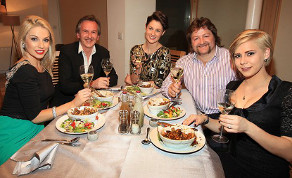 The 'Come Dine With Me' format has been sold globally
The 'Come Dine With Me' format has been sold globally |
It should be noted de Mol is perhaps the biggest player in developing TV formats. He controls Endemol, the Netherlands’ largest production and distribution company, responsible for formats such as ‘Deal or no Deal’, ‘Fear Factor’ and ‘Extreme Makeover’.
Kampff says part of the reason RTÉ is reluctant to commission homegrown formats is due to a “lack of confidence”. Billy McGrath of Sideline, the Dublin production company bringing ‘Take Me Out’, ‘Family Fortunes’ and the upcoming ‘Mastermind’ to TV3, thinks it is partly due to the fact there is so few new slots opening up.
“I don't think it's budget. I think the hardest thing is if a TV Commissioner in one hand had a proven format, and the option was to licence this format and put it on air, or on the other hand they had a brand new idea from a completely different genre that they never really saw before and put their faith in that, I'd say 99 per cent of the Commissioners would opt for the proven format, and that's the way it is. Because there's so few new slots opening up,” he says.
“Irish producers are just as fast and just as creative in developing new ideas [than international producers]; you can't blame the broadcasters, because they need to hit the ground running, but you'd like to think there would be a little bit more support or possibly a commercial angle in Irish broadcasters that will target new ideas and help to get them up to a pilot,” McGrath continued.
McGrath, currently gearing up for Sideline’s Irish version of ‘Junior’ and ‘Celebrity Mastermind’ for broadcast on TV3, has also worked with RTÉ on reality show ‘The Model Scouts’.
He admits Irish producers can be “a little bit behind” when it comes to fighting for commissions, and rather than simply accepting a rejection from RTÉ via its e-commissioning system, production companies have now taken a leaf out of international producers’ books and created show ‘bibles’. “A bible would be literally everything from the studio design to lighting to music to stings to the actual games itself, the format, the rounds, the style, what you shoot it on, how many cameras etc. A bible for ‘Take Me Out’ may run to 150 pages.
There's always limitations that we would have here obviously because of the size of the budgets so we recorded 20 hours of 'Take Me Out' in eight days in The Helix then we recorded 25 shows of 'Family Fortunes' in 10 days at The Helix. We were doing three shows a day, in the UK they do one a day, so you can see how cost effective it is for the Irish version. It's the only way we can make it cost effective and make the budget for the broadcaster work,” he says.
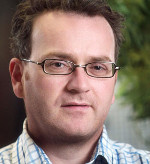 Eddie Doyle
Eddie Doyle |
One man Irish producers have put their faith into to transform the original formats landscape is Eddie Doyle, Commissioning Editor for RTÉ Two (previously Commissioning Editor for Entertainment). Doyle has developed a TV Lab Format Scheme with RTÉ, based on the concept created by Dutch national broadcaster NPO/Nederland. The TV Lab scheme airs a number of TV format pilots over a week-long slot, with TV audience and online viewers voting online for their favourite show. RTÉ has already tested the water with this new media-based system with its Storyland competition which wrapped last week.
Kampff refers to the scheme as “a start”, acknowledging that RTÉ’s role should fundamentally be as a public service broadcaster for the people of Ireland. He says original formats should be “way down their pecking order”.
But he says RTÉ should support Irish producers: “I do think that RTÉ should be encouraging creativity from the independent sector, out-of-the-box thinking. I think the only way you create creativity is that you have commissioning editors who want to take risks.”
McGrath notes: "The recent initiative from Eddie Doyle and RTÉ Two was most welcome across the board. That meant that Sideline and a large group of Irish producers had to focus now on the international angle, there was no point in developing an idea just for the Irish market, the whole brief here was to develop a format that would sell internationally".
The premise of the scheme is to make Irish domestic formats, and "work coherent propositions both for Irish audiences and for potential international buyers" according to Doyle. He and the TV Labs team currently have four pilots in development for broadcast which they chose from over 60 entries to the scheme, as well as an additional two submitted earlier through the RTÉ e-Commissioning system. All six will be voted on by the Irish public later this year.
RTÉ put up €25,000 per pilot, with a requirement that the producers had to have an international distributor on board. "We want to generate our own formats which will entertain Irish viewers and which will lend itself to potential exports. We set up a scheme which we hoped would have a win for all the partners, for RTÉ and Irish audiences, for the domestic production sector and for international distributors who are very keen on the process themselves," said Doyle.
He says international distributors see Ireland as an "interesting micro climate" in broadcasting terms, because we fit the bill of English-language, and, according to Doyle, "a lot of our producers have a sensibility for the UK market or the American market in terms of the broadcasting culture.”
He adds: “We're in the footprint of some of the best broadcasting in the world which spills over from the UK so we have to compete with some of the best TV in the world. Because we're a smaller market with smaller budgets, because of the scale of the economy, and the fact that we're generating English-language, we have to compete, we're almost in this David-Goliath thing with broadcasters, and as programme makers from the start."
McGrath concurs that international distributors have a lot of praise for Irish producers: "They're very conscious that Irish producers and Irish broadcasters have very very high production values. In a way that is determined by the fact Irish audiences watch the best TV in the world, either American stuff or the UK shows. But we certainly don't have the same budgets."
Although RTÉ is keen to keep details of the six chosen pilots under wraps for now, IFTN can reveal all six international distribution companies attached are "big players" in the TV format world, and are the most sought after distribution companies during the MIP TV conferences, having collectively brought a number of high-profile formats to households all around the world.
Despite these types of formats having their critics, especially reality-based shows, (Senator David Norris criticised TV3's 'Tallafornia' earlier this year, and even rapper Snoop Dogg criticised 'The Voice' (US) claiming it didn't produce rounded artists), Irish audiences still relish in the idea of a TV format. Doyle says there an increasing amount of examples of programming that "demonstrates the appetite that Irish audiences have for marquee international formats".
Morrow says he doesn't think formatted TV is "necessarily connected with dumbing-down", despite these formats being produced on a mass scale and shown to mass audiences around the world. "I think it just really depends on the local version of these formats, it's very case by case, I think you'd have to talk about a specific format to look at how they have adapted them in cultures. We've just done a series with Dara O'Briain in the UK about pure maths (School of Hard Sums), which is a format that is ultimately the opposite of dumbing-down," continued Morrow.
Only time will tell if an Irish production company will produce the next ‘CDWM’ or version of 'Idol'. RTÉ is scheduled to air the six TV Lab pilots in September. Doyle is optimistic Ireland could very well become the next Netherlands, or even the market leader the UK: "You can't be the mouse in the road here, because we [Ireland] have the right sensibility, the stripped-down budgets, which [international distributors] see as giving us a competitive edge. We have to work harder to fight against the bigger global brands. People like doing business in Ireland."
Morrow says "Ireland is a lot more creative" than other countries paving the way in the format world, while Kampff believes advances in technology will only be an advantage to developing original formats: "We are in line for another wave of innovation that's going to be multi-platform in a true way. In the mix of all of that something may emerge that is truly global, and there's no reason why it can't start in Ireland."


